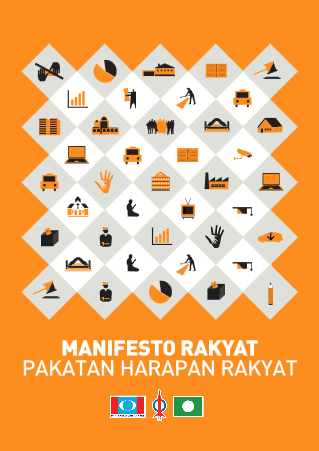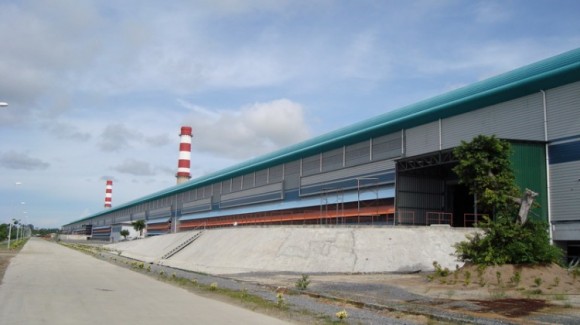
THE Pakatan Rakyat (PR) released its manifesto amid much fanfare at its national convention on 25 February 2013. The coalition promises to raise Malaysian household incomes to at least RM4,000 a month, increase the minimum wage to RM1,100 and create one million jobs should it come into power.
On the environmental front, the federal opposition pledges to halt the Lynas rare earth refinery’s operations in Gebeng, Pahang, review a multibillion petrochemical project in Pengerang, Johor, and the mega dams in Sarawak. It targets to reduce traffic congestion in the Klang Valley and other major cities by 50% during its first term via investments in public transport. Furthermore, it says it will reform existing logging laws and activities.
Granted, the manifesto is an improvement from Buku Jingga, the common policy platform the PR unveiled in 2010, which neglected the environment and indigenous rights entirely. But it remains lacking in many areas. What else does the PR need to consider to demonstrate they are able to plan for the future and provide sustainable development if voted into power?
Food security
The PR laid out several measures to reform our economy but completely ignored the agriculture sector in its manifesto. This is problematic as Malaysia has become a net importer of food. The country spent some RM221.8 billion on food imports in the past decade.
We have chosen to specialise in cash crops such as oil palm and rubber at the expense of food crops, according to Professor Dr Fatimah Mohd Arshad from Universiti Putra Malaysia. Nearly 84% of our agricultural land is used for export crops, with oil palm taking the lion’s share of 63.4% in 2005, she pointed out in an article, Global Food Prices: Implication for Food Security in Malaysia, co-written with Anna Awad Abdel Hameed.

Meanwhile, federal allocation for agriculture plunged from 17% of the annual budget in 1990 to 5.8% in 2005, Fatimah and Anna Awad highlighted in their piece published in the Journal of Consumer Research and Resource Centre in 2009. And while the federal government dished out generous cash subsidies to paddy farmers, it left other food sectors out in the cold to develop with minimal support.
With supermarkets easily available around town, living in the city creates an illusion that food supply remains abundant. But the rate of global population growth has long surpassed the rate of agricultural production, Fatimah and Anna Awad noted. Global food prices will continue to rise as an unpredictable climate further reduces crop yields. Low-income households, who spend the bulk of their income on food, are the most vulnerable to food price hikes.
What will the PR do to reform our agricultural sector and feed Malaysia’s growing population, which is approaching 30 million people, with nutritious, affordable food? What steps will it take to encourage organic farming and sustainable fishing practices? How much will it invest in agricultural research and development? These are just some of the questions the PR needs to deal with.
Renewable energy
Another important sector neglected by the PR in its manifesto is the power industry. Aside from a pledge to scrap independent power producers’ gas subsidies and divert it to lower electricity tariffs, the coalition makes no further mention of the energy sector.
Despite it being a necessity in modern life, some Malaysians, particularly indigenous people and communities living in remote areas, still do not have access to electricity. What will the PR to do ensure every citizen enjoys reliable, affordable power supply?

Malaysia is expected to become a net oil importer in two years, according to current Energy, Green Technology and Water Minister Datuk Seri Peter Chin. Our country relies largely on gas and coal for power. An overdependence on fossil fuel has resulted in renewable energy sources taking a back seat, the minister conceded in 2012.
In the face of depleting local gas resources, what will the PR do to ensure Malaysia’s energy supply? Will it import more coal? Will it consider nuclear as an option? How much will it invest in renewable energy sources such as solar, biomass or other options?
In addition, the level of Malaysia’s energy consumption versus productivity remains low compared to countries like Singapore and Japan. What innovative measures will the PR implement to cut wastage?
Meaningful public participation
The PR also needs to assure the public that it will hold genuine public consultations before approving major projects. Decades of local governments approving “development” projects without taking into account the existing capacity of roads, drains and other infrastructure has resulted in traffic congestion and flash floods becoming the norm. Coupled with the lack of green spaces, the quality of life in most cities is deteriorating.
Proper public consultation and provision of information will help towards gauging the potential environmental and social impact of a proposed project. It is thus surprising that the PR’s manifesto is silent on the abolition of the Official Secrets Act and the enactment of a Freedom of Information Act (FOIA). Some PR politicians said the manifesto should be read together with the Buku Jingga, which does mention freedom of information. But wasn’t the manifesto built on the Buku Jingga? How is it that the FOIA was excluded?
Comprehensive government
There are many other environmental issues a PR federal government will have to face. For instance, whether controversial projects already in operations, such as the gold mine in Raub and aluminium smelter in Sarawak, will be reviewed; and what to do about the increasing occurrence of flash floods and how to work with our regional neighbours to avoid the yearly haze.

The young coalition has been commended by economists for advocating for a clean government. And some may feel that if the PR can implement what’s in their manifesto, it will already be an improvement from the existing Barisan Nasional government. But responsible governance is not just about outdoing your predecessor. It is about governing comprehensively, and thinking long-term. This encompasses what we will eat and how we power our homes.
Should it come into power in the upcoming elections, the PR needs to address these elephants in the room if it is serious about delivering the best to Malaysians. ![]()
There are about 100 Green Parties worldwide. Gan Pei Ling recommends that the PR look into their manifestos for bold ideas and inspirations to improve their own.


ellese says
I want to highlight two issues on this manifesto. One I find it hypocritical that PR can say in the same breath they want us to be Malaysians above [all] else with equal rights and then openly reaffirm the racist education policy of segregating our young by race. You cannot support a system denying people of other races (especially the young ones) to mix and then believe all [will] be hunky dory when we’re adults. There is no such right under the mother tounge argument to justify a government adopting an education policy segregating based on race. Just not on. There’s not even a mention in the manifesto to move to a one school system. We are sure to [be] doom[ed]. Back to square one.
The other thing which affects me most are cars. The way forward is not to have more cars but [invest] more on public transportation. By lowering car prices, abolishing tolls and lowering fuel it will make car ownership and maintenance cheap. There will definitely be more cars cos everyone prefers point to point transportation especially under our hot sun. To me this affects my lifestyle as I will be stuck in jams for ages. It’s a definite no no.
We must cut more indirect subsidy on utilities especially fuel. The one who benefits most on indirect subsidies are the rich. A BMW 750 will consume much more petrol than a kancil. Those who have swimming pools will use more electricity and water than those at pprt which mind you do not even benefit from the Selangor water subsidy. We must cut back this indirect subsidy. We must move to direct subsidies and give to those targeted groups who need most. Its more equitable. Br1m is a good example (though its politically motivated) and these people appreciate it more than those who own 750il or the swimming pool. (But bn must cut down on indirect subsidy). PR seems directionless and senseless on this point. Rafizi’s suggestion to use Petronas money is simply rubbish. This money is better used for direct subsidies if he wants more to benefit it or use for public transport such as having an mrt circular line. Otherwise Have a PR BR1M lah (but must cut down on indirect subsidy).
Anyway the discussion on pr manifesto may be useless as pr seems to say it’s not a promise. Ridiculous really. We must put both bn and pr accountable for their promises. We must stay away from hatred politics excusing accountability. The politicians are to work for us and not the other way around. My most disappointing account with pr manifesto and I expect the same with bn is the omission to reform the mother cause of all our corruption: the reform of our political financing structure and the party’s internal voting structure. It’s a systemic problem we have. The parties and values of our politicians are built on these outdated opaque systems which render them justifying fraud, manipulation, corruption, cheating, lying, double standard etc etc.
JW Tan says
Can I just point out that there’s nothing legal that prevents ethnic Malay parents from enrolling their children in Mandarin Chinese and Tamil vernacular schools? Or indeed, ethnic Chinese students in Tamil vernacular schools and vice versa. There are certainly practical obstacles (not least that the schools themselves do not believe that their interests are served by admitting large numbers of ethnic Malay students), but the current legislation does not aim to separate children by race. I agree that it does have that effect in practice.
I agree with nearly everything else you say. Save perhaps the issue of cars – we have cheap cars because Malaysians believe that owning a car is a sign of wealth, status and prosperity, and also because we have a national unprofitable car maker which our government (and many of our people) believes we should support. Until we change these mindsets, we don’t really have the will or ability to deliver large transport infrastructure projects that could really make difference to our requirement for more cars.
owlz says
I’m more interested to know how they intend to achieve their salary targets. Most young graduates don’t even earn RM4k a month and some managers make less than RM5k. How will this affect FDI inflow? Let’s be honest, the main reason many foreign companies set up plants here is because it’s cheap. Furthermore, how will increasing the minimum wage to RM1100 affect inflation and the livelihoods of small business owners? What’s going to happen is that business owners will start ‘trimming the fat’ and then we’re going to have a glut of bums who’ll just keep asking for more handouts.
I don’t want to vote for BN in the upcoming elections, but PR isn’t inspiring much confidence either.
neptunian says
Removal of massive corruption and the logical opening up of investment areas.
That is one of the major ways to achieve the manifesto. Big ideas require big solutions. Removal of major corruption will save at least 15-20% of the current Govt budget.. save $20 – $25 Billion.
I can think of at least one sector that can be opened up with a simple re-think of the operating procedures – Non-oil minerals.
Peninsula is endowed with massive minerals resources. These have not been explored nor exploited due to narrow minded policies and administrators. It is further restricted (retarded) by corrupt practices. Opening this up with efficient and sensible policies can bring in good paying jobs to Malaysians – not foreign cheap labour!
TNG says
Some PR politicians were saying removing corruption will net RM40 billion. I would love to see how they come to that figure.
Regarding non-oil minerals. Mining and extracting of these metals will always end up with radioactive waste like the one from the Lynas operation. Since PR is dead set against these sorts of radioactive waste, I guess non-oil mineral extraction is a no-no under PR. Having said that, I find it strange as to why PR vigorously objects to Lynas and yet say absolutely nothing about the Malaysia Smelting Corporation’s tin extraction factory now operating in Penang using tin ore imported from Australia.
Better My says
PR manifesto has to be at best [a] work in progress. It is going to be a marathon in terms of decades, tuned to undo the damage done, put in programs and see through the programs, fined tuned again and again to get close to what we want. It is never going to be a 100 metre sprint where you reach the finishing line in 9 seconds, or a couple of years timetable in our terms.
The terse manifesto is acceptable under the present exceptional circumstances where the odds are so heavily stacked against PR from manipulation by a terrible party devoid of ethics and decency that plays to racism to divide and rule, besides seemingly perpetuating the EC fraud for decades now, [and] still appear hell bent to cripple PR prospects with long handicaps.
To ellese, we should really [not] care [about] some hypocrisy, or mistakes, promises or not, made by PR today as key opponents, or in future when they reside at the prime office, as they are more likely [to] bend to the rakyat’s wishes, [in] private and publicly stated in the mainstream media, within political expediency, budget constraints and timeframe. Unlike the continuing mountains of hypocricies from BN with no end in sight to correct them by the rakyat, taped at their mouth at the main[stream] media.
To owlz who says “I don’t want to vote for BN in the upcoming elections, but PR isn’t inspiring much confidence either”, despite the many openly repeatedly stated policies that will open up Malaysia to create more ideal conditions for more creativity in [the] manifesto and national blue prints designs from politicians and experts, you don’t feel confidence from PR management? You are a hard person to please.
More than likely, criticisms of PR positions without referencing the exceptional conditions and constraints today are unwarranted.
First, let’s get into the door. Then the likes of ellese and owlz and all the rakyat can play a part to shape the future via PR. Then it would be magic for both ellese, owlz and all.
Faizah says
I agree with owlz. PR not inspiring much confidence – so true. BN is even worse.
I wish I could vote The Nut Graph instead.
loong says
Dear Editor
Can we get costing for all policies of both the opposition and the BN? If there is new spending, can we know how it is going to be funded? These are real questions and should not be ignored or slighted or else the parties can claim that they are unable to implement their policies at a later stage.
Thanks
Loong